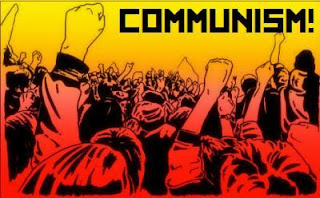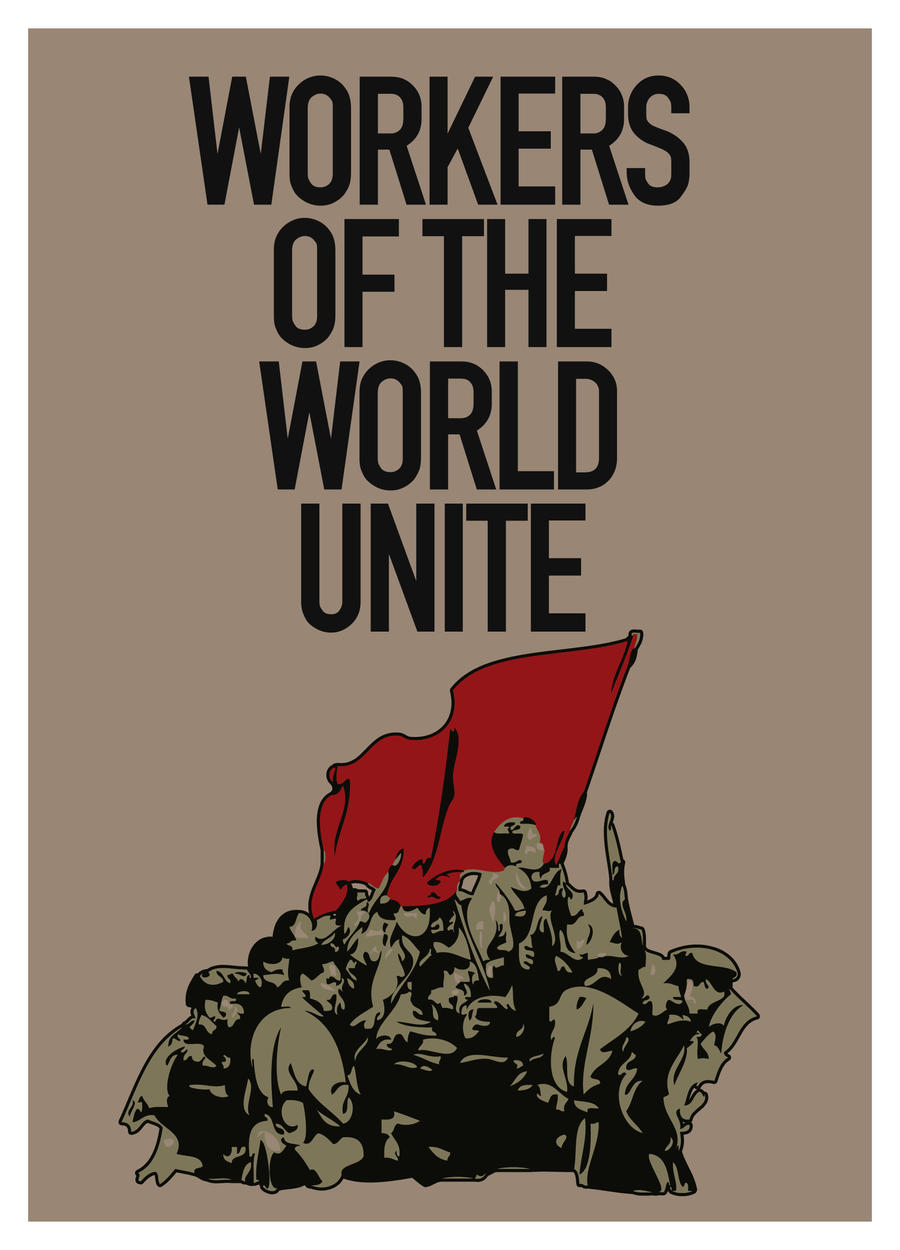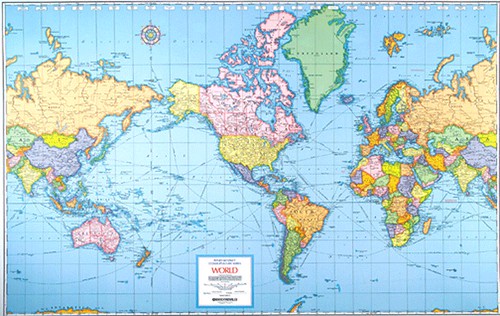But now that I finally figured out how to get the game to work on my computer again, let's take a look at a few other events in the Kaiserreich backstory that has a major Alternate History twist to it!
POD: Yet Another French Revolution
When you start a game of Kaiserreich, you are presented with a surprise: two France's! No, there wasn't some weird multiverse crisis that somehow resulted in two nations that call themselves the same but are totally different and hate each other. Nope: a left wing revolution resulted in two nations that call themselves the same but are totally different and hate each other. It's always the commies.
 |
| Maybe McCarthy was onto something... |
In 1920, after a brief civil war between the establishment and a socialist-syndicalist alliance, the Commune of France was declared in Paris. The leaders of the old Third Republic that didn't join the Commune retreated to Algeria, claiming the French colonies as the true nation of France, and that they were a government in exile. That's something you are going to hear a lot of in this mod...
Plausibility: 8/10. In a very simple overgeneralization: since 1789, the French have a habit of overthrowing ineffectual, corrupt or defeated governments and setting up a new one. Since King Louis XVI lost his head in OTL, there has been five republics, two empires, two monarchies, and a communist commune, not to mention the puppet state set up by the Nazis.
So I can see the French tossing out the Third Republic and starting the Second Commune, or whatever it's called. And at the same time, I can see those that wouldn't agree with the new order hightailing out, even if that means sitting in Algiers fuming at all that you lost and vowing to someday comeback and restore the nation.
 |
| And maybe turn the Eiffel Tower into a huge middle finger pointed at Germany. |
But, this is the big question: can this syndicalist nation survive as long as it did? That is the bigger, iffier question to me. I'm personally surprised that Germany would allow a proto-communist, left leaning extremists to set up shop that soon become really resentful and angry at losing to Germany, again. But at the same time, the Germany of the post-Weltkreig is just sick and tired of fighting, and desires peace. So maybe the leadership of the new Commune, seeing what happened when the Germans intervened in the Russian Revolution, decided to play nice, at first, and Germany was willing to let them. The lore doesn't go into detail about early Commune-Germany relationships, but I'm sure it's not all sunshine and roses.
POD: And... Britain Too?
In 1925, a coal strike in Britain quickly spiralled into violence, and when the army was sent in to restore order, the army instead revolted. A general strike shut down the nation, and in six weeks, the Royal Family, most of the Royal Navy, some of the Royal Air Force, loyalist military units and whoever did not like the idea of "equality for all" rabble-rousers redistributing their wealth all hightailed it to Canada and the other colonies, waiting for the moment to return. The Trades Union Congress then declared the Union of Britain, another socialist-syndicalists inspired by the French across the channel. The nation isolated itself from the world, content to build socialism in Britain with no one to interfere.
 |
| So... alternate history Brexit then? |
Plausibility: 5/10. This is, to a degree, odd. The way the lore goes, the Dominions and Colonies of the Empire were mostly okay with the Peace of Honour (what ended the long, drawn out war between Germany and Britain after France fell), but the Home Isles took it really badly, and all it needed was a spark, similar to the miners strike of OTL that Winston Churchill proposed solving with machine guns.
The way the game made it sound, the Peace with Honour wasn't that bad. If anything, it basically restored the status quo, with a few minor changes, like some islands being transferred around. I could see maybe there being some issues with a populace that just fought and starved and struggled for seven years, with millions of casualties and nothing to show for it: not even Ireland was given it's independence in the treaty, so it would seem that Britain at least lost, and would have something to strive to regain in the future (basically like how the Nazi's rose to influence and power in Germany OTL). But without the anger and hate, I don't see it coming to pass.
 |
| Or whatever passes as anger over in the UK. Something something football. |
The Britain from 1921-25 would be directionless: all the sacrifice, all the fighting, and everything just went back to what it was, just with a lot of men dead. So a minor crisis that a somewhat indifferent government and upper class tried to crush away boiling over, but I don't know if it would be a socialist revolution, or even if it couldn't be suppressed or with some reforms to molify the masses. Maybe a socialism with some nationalism thrown in, but I don't see much of that in the lore of the game. So I'm on the fence of this one.
POD: The Sun Never Sets on the German Empire
Germany managed to win a few colonies in the aftermath of the Weltkrieg. But they gained a lot more with the British Empire collapsed and went socialist. It wouldn't do to have these prime areas of real estate to just become independent, or, worse, becomes part of another empire. Nope: They had to be taken. The colony of Mittelafrika, composed of the old Belgian Congo and former German territories, along with British possessions like Kenya, Tanzania and others, is just one of these new colonies: southern China is the personal fiefdom of the Allgemeine Ostasiatische Gesellschaft, the German East Asian Company, while many other territories like the Suez Canal, Singapore, Sri Lanka, and many other islands and cities are now all part of the great and glorious Kaiserreich.
Plausibility: 1/10. This is perhaps the least plausible part of the entire mod. According to the backstory, even after 1921 Germany was still fighting, sending troops to make sure that Russia's Civil War didn't turn into a Bolshevik victory. But then in 1925, four years later, suddenly Germany is able to basically occupy and bring areas from Africa to South East Asia to a third of China into puppet states and colonies and corporate fiefdoms with, as far as I can tell, little issue and bloodshed?
 |
| And a hint of domineering paternalism and subjugation for good effect |
The Germany they described in 1921 has just won a Pyrrhic Victory, and was on the verge of economic and social collapse after seven years of the British blockade, total war, and failed harvests. Apparently Admiral von Tripitz, as the new Chancellor, was able to turn it all around starting in 1924, occupy most of Africa and Britain's Asian possessions by 1925, and set up a Chinese empire with the permission of the teetering Qing Dynasty in 1926.
Yes, there would be a vacuum of power if the British Empire collapses, but my guess is that Germany wouldn't be able to simply march in, place their flag where the Union Jack was, and all would be good. I'd see revolutions, strikes, bloody uprisings, syndicalist/socialist/nationalist upheaval that, should the German Empire get involved in, would cause the already war weary people to rise up in their own revolt at sending even more soldiers to die in places far away from home.
Most of the map of Kaiserreich should be a lot of small states in Africa and Asia, former colonies suddenly cast adrift with no one but the strong local warlords to replace it. Maybe Germany, the Ottomans, even the Austrians and Japanese, would get a few possessions. But not as much as we see in game.
 |
| "And zis piece is mine, and zis one, and zis one..." |
POD: Crouching Russia, Hidden Bolsheviks
Russia in Kaiserreich is, quite simply, a mess. The White's won the civil war with help from Germany, and Alexander Kerensky became President of an unstable, weak, divided, and much smaller Russian Republic, but he's the only person capable of holding everything together. Finland, Ukraine, the United Baltic Duchy, White Ruthenia, a union of Cossack territories, several central Asian countries and a couple Japanese puppet states had all been created from it's territory after the Weltkrieg. Political divisions, communists, and reactionaries besiege the nation from all sides, and it's a question of when, not if, it will all come to a head.
(Spoiler alert!) Within minutes of starting the game, Kerensky will be dead, allowing a Russian player to guide Russia to it's destiny: wether communist, national populist or something in between.
 |
| And time to bring back the armoured trains! |
Plausibility: 4/10. There are a few issues with this scenario, namely in the Civil War. According to the backstory, the White's of the Russian Civil War got together in 1919 and agreed to name Kerensky as their unified leader. But the White's of the Civil War are a diverse group, ranging from monarchists wanting to put the Czar back in power to democrats that want to forge a new destiny for Russia (and they, in turn, divided between democratic socialists and lassiez-faire liberals). Agreeing with Kerensky, who had already failed to hold the country together after the February Revolution before Lenin and his Bolsheviks overthrew him in the October Revolution does seem to be a a bit of a stretch. But the idea of a unified White movement isn't totally outlandish, I feel.
Then there is the German intervention. I think the problem with some of the backstory of the mod is that it's acknowledged that Germany had nearly fallen apart after the Weltkrieg, but then the game has Germany intervening around the world within a couple of years. It's seems highly unlikely that Germany would be in shape, or have the political or popular support to go east again. Supplies? Maybe. Volunteers? Alright. But a full fledged army sent in to the quagmire of Russia to prop up a "democratic" Russian regime? That feels like a bit too much, and should have resulted in riots and revolution back in Germany.
But what do you think? Do some good ol' French and English revolutions make sense? If you have a comment or a suggestion, either email me at tbguy1992@gmail.com or look for me on Twitter, @tbguy1992.







